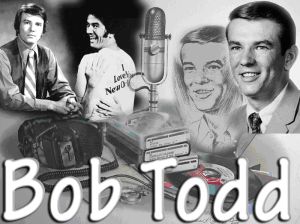
The 60s was a magical decade for Top 40 Radio. 1969 was a magical year to be in radio anywhere in the United States. The Vietnam War was raging. The torch was passing from the
Glen Miller generation to The Baby Boomer Generation. Woodstock happened in August of that year. We'd just been through a decade of assassinations and our music was making a political impact that would be felt forever more; some for the better, some not so good. It was the dawning of the Age of Aquarius. And it was a magic year to be in radio in Louisville. 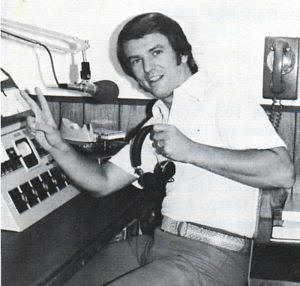
Bob Todd
In January of 1969, Al Smith, ex-KBOX & Shreveport, Louisiana Top 40 radio disc jockey was the new General Manager of WAKY radio in Louisville. Bob Whitney, an ex-1950's Top 40 radio disc jockey, was the National Program Director for LIN (Louisville Indianapolis Nashville) Broadcasting, who owned WAKY. I was a young 23 year old 1960's Top 40 hotshot DJ, Music Director and Program Director from WQXI ("Quixie") in Atlanta. Classic Top 40 radio was about to make itself known in Louisville, Kentucky and we were about to rescue one of America's great radio stations from mediocrity. But it wasn't just us. It was the team we created. It was magic.
I met Bob Whitney in Philadelphia in late 1968. My ex-boss at WQXI in Atlanta, Kent Burkhart, sent me to him. Bob Whitney was a big name in radio in those days. He had been a muckety-muck General Manager with the Westinghouse-owned station in Philadelphia. He was the creator and independent producer of the
Dick Clark Radio Show, which aired on the ABC Radio Network in the late 50s out of Philly. 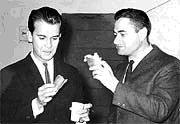
Dick Clark & Bob Whitney 1958
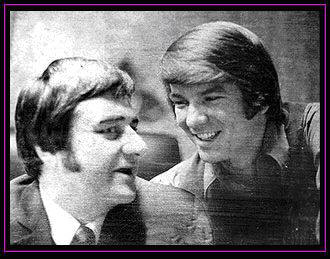
Bob Whitney and Bob Todd circa 1970
Bob Whitney was also the founder of MARS Broadcasting. He was a famous name in Top 40 Radio and had worked with, and knew, many of the radio greats. I was in awe. I really felt lucky to meet him. And for some reason, he liked me. He'd been at KALL in Salt Lake City and later WIL in St. Louis as I recall, but Bob really made a name for himself in radio when he did the unthinkable; he blew Gordon McClendon's flagship station KLIF out of the water in Dallas with little ole KBOX.
At KBOX Bob discovered Dan Ingram who later became an icon at WABC in New York. Anyway, Bob heard from Kent Burkhardt that I had done a good job on the air in Atlanta with a 52 share in PM drive, and as Music Director and Program Director. Plus I had a background with Paul Drew as PM Drive DJ at 50,000 watt CKLW during that station's turnaround, and also a short stint during the turnaround to the Drake/Drew format at WIBG ("Wibbage") in Philly. After spending the night in Bob's garage one cold December morning in 1968, I was elated when he offered to send me to Louisville as PD to change the format at WAKY and turn the station around from #5 (or whatever it was) and do whatever it took to make the station #1 again, just as it had been in the 50s and early 60s under Gordon McClendon.
 The WAKY Challenge It was a huge audacious goal. What fun. We decided to bring back the use of the term, "WAcKY", which is what McClendon called it. WAKY had been #1 in Louisville from 1957 through 1963. When McClendon sold the station, the new owners ran it downhill and allowed Louisville's WKLO to take over the dominant Top 40 reigns. It was my job to shake up the market and regain WAcKY's former stature as the premiere Top 40 station. In all honesty, it really was pretty easy to see how to accomplish the task. I stayed at the Brown Hotel in Louisville for one week just listening and deciding who would stay and who would go as I analyzed WAKY's format and sound. I listened to WKLO too. WAKY had a great 5000 watt low-dial signal on 790 -- a much better signal that WKLO's 10,000 watt directional at 1080. Although WKLO had Bill Bailey in the morning -- and he seemed unbeatable -- the rest of the station was pretty unremarkable, and actually rather amateurish. But so was WAKY in many ways. 1969 WAKY Format Sheet There were good jocks on both stations, but they had no station identity. They were playing way too many records -- and many of the wrong ones. The market just lacked excitement. There was no promotional creativity, ingenuity or immediacy. The jocks sounded bored. WAKY needed some major-market entertainment talent, and to return to playing the hits more often. Pretty simple: they needed personality and promotional excitement. They needed a disciplined format. They needed to sound like one team rather than a bunch of individual disc jockeys running off in different directions. The station needed an identifiable sound. With Bob Whitney's support at headquarters and Al Smith at the helm of the ship, WKLO didn't stand a chance. Al Smith 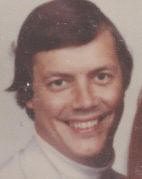
Al Smith - 1969
In those days of Top 40 competitiveness, no PD could be successful in a turnaround situation without a General Manager who was willing to control the Sales Manager and his team of money-hungry vultures from destroying the programming. The General Manager had to have programming sense too, to allow a PD the kind of autonomy necessary to operate independent of influence from the Sales Department. Al Smith was that kind of GM. He held sales and corporate at bay. We probably spent more money than we should have, but with Whitney and Al behind what I was doing, programming took the lead. That's why WAKY became the great radio station that it was. Most stations were run by the sales department, but not WAKY under Al's watch. Al Smith and I became a great management team. He was a very savvy GM. He sat on the sales department and convinced them that it was in their best interest to be patient. Let us get the ratings and then they could raise the rates and make serious money. He didn't allow them to go beyond certain limits. No dumb remotes or sales promotions. Sales had to have no say in programming. They only had 30-second spots to sell, and a limited number. Only 60 second breaks as I recall was the format of the day. Only 12 minutes an hour. The rest was "More Music" with what were known as "sweeps" -- 3 songs in a row with no talk. (Al and I went on later to become partners in a radio station and remain lifelong friends to this day.) Johnny Randolph 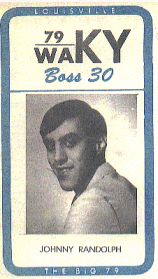
Johnny Randolph Survey - March 1969
Johnny Randolph was there when I arrived and I immediately made him my full-time Assistant PD and Music Director AND he did a weekend shift. He was invaluable. I was an off-the-air PD, except for voicing the promos and liners. It was the first time since 1963 that I'd not done an airshift. Randolph was a terrific organizer and a remarkable guy. We worked side-by-side. Since he'd been at WAKY for awhile, he knew all the record promoters, and he was great with people both inside the station and out. I immediately thought the world of Randolph. Al Smith was great with people, too. And he was out of programming rather than sales, rather unusual for General Managers. The Sales Manager, J. Douglas Kimble, looked at Al as a mentor so the management team was very strong. The station quickly became a vibrant team operation, which of course is what it takes to be #1. I always believed that that showed on the air. You can't fake it.
When John Randolph became the PD upon our departure from LIN Broadcasting, he ran WAKY admirably and very successfully for several years and really made his mark in the annals of Classic Top 40 Radio until -- I guess -- FM took all the listeners away from nearly all of the music-formatted AM stations by attrition in the late 70s. One of the legendary stories that took place after Al and I left is how the jocks made sure Randolph was appointed PD. Seems the other WAKY jocks got evening jock Dude Walker drunk and Walker informed the new GM Don Meyers that Randolph had to stay on as PD or else. Afternoon jock Gary Burbank backed Dude up and all the other jocks joined in. They wanted to keep the ship on an even keel and they made it known that Meyers make Johnny PD...or else! The or else, of course, was that there would be a major walkout if he didn't. The station was a team -- and they all wanted it to stay that way. The creative genius of each and every one of them was allowed to blossom, and damned if they wanted somebody new to come in and screw it up for everyone. Meyers was smart enough to say, "OK, if you want Johnny Randolph to be PD, Johnny Randolph it is." Good decision. Everyone involved became a better person for it. And the station stayed #1 until Top 40 radio on AM died a natural death. WAKY would probably still be on the air today -- and on top -- if there had been no FM. Kane, Smith and Lundy Jackson Kane did middays along with Mike Smith until Jackson was replaced by Cris Lundy, an old friend of Burbank's. And somewhere along the line I think Johnny had to go on the air full-time, I think to replace Mike Smith, who wasn't there very long, either. Johnny didn't want to do that either as I recall, because we were both working so hard the other 25 hours in the day. But he did it anyway, because it was in the best interest of the station. That was the way we did things at WAKY. We all did what was best for the station -- and making it #1 and keeping it that way was our goal. 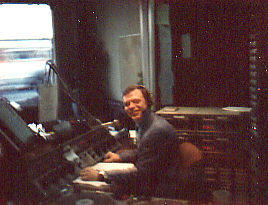
Mike Smith in the WAKY Studio - 1969
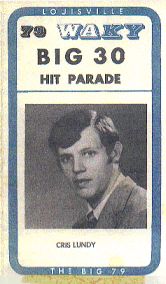
| 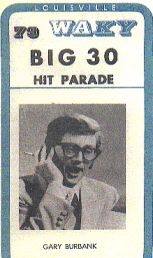
| Cris Lundy Survey
September 1969 | Gary Burbank Survey
September 1969 |
Gary Burbank We hired Johnny Apollo from WMPS in Memphis and I like to say that I hold the honor of renaming him "Gary Burbank." But actually Johnny Randolph and I probably share that honor along with John W. "Dude" Walker. Remember, it was a team effort. Keep that in mind. That was the power behind the station. So I have to say that we all came up with the idea together one fateful day in the production studio when Dude contacted him on the phone to talk to him about coming to Louisville. I thought he sounded just like Gary Owens. And he certainly did. We had him say; "This is Gary Burbank in beautiful downtown Louisville" over and over and taped the conversation as I recall. What a stitch. I wish I still had that tape. I could probably sell it on eBay for big bucks today. At first he didn't want to come. And he really didn't want to change his airname. I mean, "Johnny Apollo" had such a ring to it. But it wasn't his real name anyway so what difference did it really make. Billy Purser wasn't too magical either. And Gary Burbank was definitely a marketable name. I suppose that Dude Walker actually made the hiring of Burbank happen. Johnny Apollo had taken Dude's place at WMPS when he left for WAKY a few months before I arrived in Louisville. Eddie Braddock, the famous independent promo guy from Memphis (everybody knew and loved Eddie) and Dude had known Johnny Apollo from WMPS and Eddie suggested we fly down to meet him when he got off the air. So we did. Dude and I got on an airplane and went to Memphis. It was a real sales job. "Gary-to-be" Apollo met us at the Peabody Hotel in Memphis right after his shift, and he wasn't chomping at the bit to leave Memphis. But somehow we convinced him after kicking it around that Johnny Apollo had to come to Louisville and become Gary Burbank. So he did. The rest is history. Gary Burbank was an overnight success in afternoon drive. "Laugh-In" was the top TV show in the country at that time, but the Louisville NBC affiliate didn't run the show live on Monday nights; they tape delayed it until Friday night. So, Burbank's mom -- who was living in Memphis -- recorded "Laugh-In" on audio tape on Monday nights and overnighted the tape to Gary on Tuesday. This let Gary tell all the jokes from the program Wednesday through Friday. Stealing the Laugh-In jokes and one-liners from the #1 TV show of the day made afternoon drive #1 in 30 days. But it wasn't just the jokes. It was the way they were delivered that made it work. By the way, Gary has since become good friends with Gary Owens, who considers Burbank's act a compliment. Gary Burbank has gone on, of course, to become an icon in Cincinnati, where he and his alter-ego Earl Pitts have been dominant in 8 states for over 25 years. He's still a great friend of mine and of radio.
I remember that Johnny Apollo Burbank wouldn't come to Louisville unless his friend Jack Kane came along too. So we hired him in order to get Burbank. Shortly after he arrived, Jack tried to organize the WAKY DJs into the AFTRA union. We couldn't have the union running the station. I had been in the AFTRA union in Detroit at CKLW and hated it. Talk about organizing mediocrity and stifling creativity. (Sorry to offend you union guys). Anyway, I fired Jack. I don't remember what the reason was, but you can rest assured it was a good one. (You can always find a good reason to fire someone if you want to!) Kane was a nice guy in other ways and I didn't really want to do it, but I had to if WAKY was going to be more than mediocre. It was one of the most difficult things I ever had to do. Burbank fortunately stayed on and the rest is history. The "Burbcaster" became one of the best "Broadbankers" in the business -- and he still is. You can listen to him "live" every afternoon through the WLW Website. I've got lots of Burbank stories, and so does he. He lives part-time in Florida with his wife Carol, often broadcasting his WLW 3-6 p.m. show direct from his home studio on the Rainbow River. We're golfing buddies. He carries a big stick. In fact, I'm listening to him on the Internet as I'm writing this. Skinny Bobby Harper 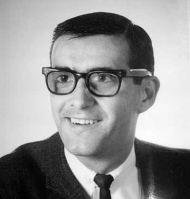
| Skinny Bobby Harper - 1968 | |
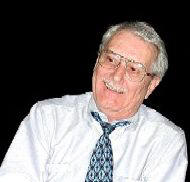
| |
Bob Harper -
2001 |
We brought Skinny Bobby Harper up from WQXI in Atlanta (where I'd hired him away from WKNR ["Keener"] in Detroit while I was at Quixie) to do mornings at WAKY. Harper was one of the most talented DJs of all time. He did voices like Jonathan Winters and told jokes and talked sports and just had a wonderful air presence. "Wonder Mother" was his female antagonist who always barged in (complete with appropriate door open sound effect) with a caustic remark...and then would leave the studio with a door slam. Harper was the best morning man in the country in my opinion. I had previously worked with him in Fort Wayne, Indiana in 1966 at WLYV and at WQXI. He'd also been in Detroit at Keener, in Cincinnati at WSAI, and in Buffalo at WYSL. We knew a lot of the same radio people and I really admired and loved his act. He was great. Skinny Bobby Harper would be #1 and beat Bill Bailey at WKLO if anybody could -- but it was going to be tough -- even for someone with Harper's talent. The Duke of Louisville (as Bailey was known) had his hands around the bat like a real Louisville Slugger. Hell, he had a strangle-hold on that bat and wasn't about to let go. And truth be known, Harper never did beat Bailey. WAKY was never #1 in the morning until Bailey left WKLO to work at WLS in Chicago for a six-month stint. But Harper sure tried. I wish I could listen to Harper today. Bob Harper died in 2003 way too young at age 64. I'll always miss him. I went to his memoriam in Atlanta and I cried from my solar plexus. His daughter Krissy was the apple of his eye. I stayed with Bob at the hospital waiting for her arrival -- and I'll always try to stay in touch with her and his ex-wife Karen and son in California. I truly loved that guy. Among the least of his accomplishments he was the inspiration for the character Johnny Fever in WKRP. Among the most was the impact he had on his friends. God, how I miss him now. Just to pick up the phone and talk to Harper over the years was an upper. We were our own mutual admiration society. 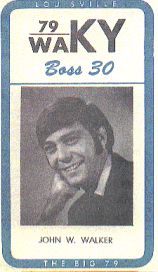
John W. "Dude" Walker survey - May 1969
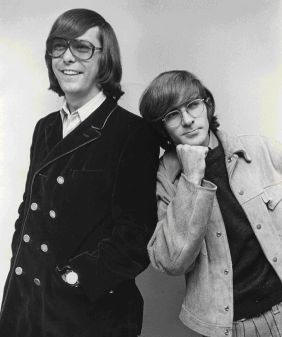
"Dude" and Johnny Walker 1972
We had John W. "Dude" Walker from Memphis who was smooth as glass in PM drive before Burbank came in. That was what it was like at WAKY. Dude actually instigated the hiring of Burbank knowing full well he'd have to move to 6-9 PM and out of afternoon drive. But he felt it would be in the best interest of the station. He wanted us to win. And in combination with the Weird Beard from 9 till midnight, together they had the teens locked up. Both of them were great jocks. I can't say enough good things about Dude, not only as a jock, but as a person. And of course, Dude Walker was one of the best jocks in the country with a deep voice that made the teenage girls swoon. He was handsome too. The girls would drive by the showcase studios and wave at him with stars in their eyes. John "Dude" Walker went on to join Al Smith and me to become our Program Director at WDXB in Chattanooga in the early 70s where he teamed up with another great: Johnny Walker. The "other" Johnny Walker went on to become a big name in Baltimore radio, but passed away in 2004. They made a great team. Today, Dude Walker is back in his hometown of Memphis. If you talk to Dude you'll hear lots of stories about the great days of radio in Louisville...and Toronto...and Chicago...and Memphis, where he had a remarkable career in television too. A 6 handicap golfer at one time, Dude's now on medical disability from several heart bypasses, and he's still married to his beautiful wife Cynthia. He has much to be proud of: an illustrious radio career at WAKY in Louisville, CHUM in Toronto, WMAQ in Chicago, and 18 years in front of the camera doing weather and then sports on TV-3 in Memphis. Today he is a wealth of radio and broadcasting history. Weird Beard 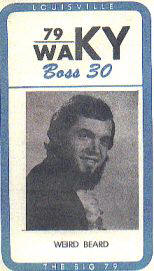
Weird Beard Survey - June 1969
As I mentioned, Weird Beard was on at night. He had lost a child in a drowning accident and it made the news. "Weird" looked like a Quaker or a Mennonite -- but the kids loved him. He had such a nice personality. Everyone that knew him liked him immediately. He was great with the teenagers. He was always letting them in the studio during his show. I didn't really want that to happen and I told him so. But he did it anyway and I never enforced the rule or said anything to him about it. I didn't want to stifle his creativity. Most PDs won't allow guests in the studio because they thought it would be distracting. But it only made Weird better on the air. Of course, he wasn't really weird at all. He was a really nice guy. I wish I'd known him better and longer. Mason Lee Dixon 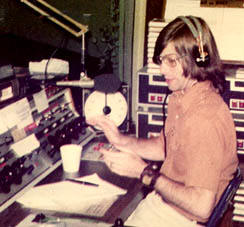
Mason Lee Dixon at WAKY
Mason Lee Dixon did all-nights at WAKY. And he cooked. What a team of jocks. The station sounded great. Mason played music until 1 or 2 and then, believe it or not, in the middle of the night the station changed formats to talk. Can you believe a Top 40 station changing formats like a block-programmed, boring, old-line MOR station? We needed public affairs programming to satisfy the FCC, so Mason delivered "The Mason-Dixon Line" -- a talk show -- and he did it so well, it was unbelievable. If we'd wanted the station to be talk full-time I'd have put him in PM drive. But talk on radio was way ahead of its time. Remember, that was before the massive popularity of FM, so it was quite an experiment. It could have been a disaster. But it worked. And it worked because of the way Mason Lee Dixon used his mind on the radio. I just found out that Mason is still in Louisville but not in radio. Nights were magic at WAKY. There wasn't a bad jock on The Big 79. The Monster Mash? One of the
"Legends of Louisville" revolved around WAKY and Sheb Wooley's "Purple People Eater." The story goes like this according to the author of that website: | MONSTER MASH It's usually used as an example of how tame radio is today. It's the story of how WAKY-AM switched to a rock-and-roll format in the '50s: by playing the already annoying hit "Purple People Eater" for an even more annoying 24 straight hours. Real or apocryphal? Somewhere in between. WAKY did play the song for 24 hours, but not straight for 24 hours. It alternated "Purple People Eater" with other Top-40 tunes. The station wanted to get the message across, but didn't want to lose all of its new audience in the process." |
I don't see what the Monster Mash caption has to do with anything, as that song wasn't released until 1962. Whoever the jock was (I heard, but can't remember offhand) played ONLY Purple People Eater for 24 hours as I recall the story. It followed a gambit that the jock had locked himself in the studio and introduced Purple People Eater every time as another great new song. It caused a furor and WAKY had gotten the attention of the market.
The Battle of the Giants We did a similar thing in 1969, only we did it for an entire weekend. During "The Battle of the Giants" the WAKY disc jockeys manned the bank of phones when they weren't on the air. No spots ran all weekend. We played only MUSIC. A full page newspaper ad on the preceding Friday stated in large letters: "WBOG starts today at 5 PM on Radio 790." There were also lots of little one column 2-inch teaser ads placed throughout the paper saying "WBOG STARTS TODAY." Additional teaser ads with little sayings I can't remember ran all weekend in the newspaper urging folks to tune-in. 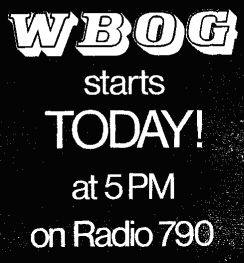
A "WBOG" newspaper ad
As for The Purple People Eater: we didn't play it for 24 hours like McClendon had in 1957 but we started off the Battle of the Giants with it as "The Champion." And the Battle went on for 3 days. The Big 79 was born with The Battle of the Giants in March of 1969 after lots and lots of planning and rehearsals; even an all-night rehearsal of the format off the air for all of the jocks.
|
WBOG AIRCHECK
Program Director Bob Todd kicks off WAKY's
3-day "Battle of the Giants" promotion on Friday, March 28, 1969.
Download
It!
21:57 - 7717 KB |
Some background: I had taken (a nice word for "stolen") the idea from the idiosyncratic programmer Mike Joseph. He was the consultant who kicked off WKNR -- Keener in Detroit -- with the Battle of the Giants in 1962 (I think) and ended up taking the local Detroit market by storm. (WKNR is another great Top 40 Radio story, and they have their own tribute website that is worth visiting.) I was really fortunate to be in the right place at the right time to start my Top 40 Radio career in my hometown of Battle Creek, Michigan when old-line WELL switched to WKFR (Keener 14) in the fall of 1964. And we did it with -- you guessed it -- The Battle of the Giants. A year or so later Mike Joseph hired me to come to Ft. Wayne for the turnaround of WLYV. It was January of 1966 and I was at the ripe old age of 20 as the teen night jock taking on giant Westinghouse powerhouse WOWO. That's when I met Bobby Harper. He did mornings. And we kicked off WLYV with -- you guessed it -- The Battle of the Giants. So naturally, I copied the entire gimmick in Louisville. We actually ran the promotion pretty much the same way it was described above.
It worked like this: At 5 PM sharp we played
"The Purple People Eater" by Sheb Wooley as the Champion song in a Battle against a Challenger. "Battles" were contests -- with prize-fight sound effects and atmosphere -- complete with the "ding" that became famous later on in our format. These "Battles" were held between the all-time great rock & roll hits of the past 15 years. We'd play two songs and then have the audience call in to vote on their favorite. It went like this: Announcer: (Crowd noise SFX) "In this corner (ding SFX) The Champion!" Then we'd play the champion song.
"And in this corner...The Challenger!" (Then we'd play the challenger song.)
"You're listening to WBOG...The Battle of the Giants!"
We'd then play a top 10 hit while the votes came in and were tabulated.
And then we'd start all over. The winning song was played again to take on a new challenger -- and it went on like that until the challenger became the champion only to once again lose in the voting eventually -- sometimes sooner than later -- to another challenger. Sheb Wooley's Purple People Eater was our first Champion song...and I think stayed Champion for a couple of hours, until the audience became tired of it and voted it down. I think Elvis Presley's "Don't Be Cruel" was Champion the longest (for over 4 hours) until finally the audience had had enough of hearing it, too. Between matches we played the Top 10 and only the best Top 10.
From then on, Oldies at WAKY were called "Giants." We instituted "Super Giant Weekends" and promoted Louisville and the area as well as the station with nostalgic promos. We always promoted and contested heavily. The Battle of the Giants promotion created such word-of-mouth and instant listenership that everyone in town was talking about it by Monday. It caused a turnaround of the entire market in those 3 days. Everyone thought that WAKY was going to change call letters and become WBOG. But Monday came and there was no WBOG. Lo and behold there was only a NEW WACKY and they were treated to our new format and the new jocks that were all ready to hit the air. We had a new PAMS jingle package (actually 4 acapellas that cost only $300 mixed with our production). But they were fantastic and helped immensely with our whole new station sound and format. We also had a CHARGE jingle that was played often, as well as lots of music sweeps. But even though the station was music-intensive, there was always personality. WAKY #1 WAKY came out #1 in the April Hooper ratings. Its chief competitor WKLO was history, except for the morning show. Bill Bailey was still holding on -- but barely -- and The Big 79 was born. After the first Hooper ratings came out, we arranged for WKLO to receive with our compliments a huge black wreath with a sash across it -- just like the winning horse in The Kentucky Derby receives. Only there weren't any roses. It was filled with black carnations. The sash read: "In Memoriam." We had it delivered to WKLO's Showcase Studios by a local florist during the 8 o'clock hour of the Bill Bailey Show. In fact, we timed it to arrive when their PD Carl Truman wiglesworth and the GM/owner (I can't recall his name offhand, but a real tyrant as I was told) arrived for work. The wreath had the ratings posted on it. The people at WKLO were irate...tee hee. How demoralizing it must have been. But hey, all's fair in love and radio.
A month or so later Al Smith and I went out on the town with Bill Bailey and got him really drunk one night -- not an unusual occurrence for Bill. We took him back to WAKY at 3 a.m. and signed him to a hastily typed up contract paying him twice what he was making at WKLO to take over mornings at our station. It would have been the coup de' grace to 'KLO. Well, to make a long story short, he chickened out and didn't come over -- although he did a few years later. Contracts aren't really worth the paper they're written on anyway. What could we do? He didn't want to be a turncoat -- and it is to his honor that he had that kind of loyalty -- but I think he secretly really wanted to be with us because he could see we were a winning station. If he had come to WAKY it would have been a REAL BIG COUP. I really liked Bill Bailey. I also loved Bob Harper. He was a much better disc jockey than Bill. But Bailey was a character that had become institutionalized in Louisville...and was a true entertainer. In spite of his talent, Harper would have had a hard time beating Bailey. So, we contacted John Rook, the PD from WLS in Chicago, as we knew he who was actively looking for a morning man. We sent him Bailey's ratings and Rook hired him away to the Windy City of Chicago. The rest is history. WAKY was #1 and stayed that way until FM started to take over in the mid 70s. Skinny Bobby Harper then had mornings all to himself until we both left to go back to Atlanta to do "The Now Explosion." Bill Bailey got tired of working at WLS and returned to Louisville, this time to WAKY. That just put the icing on the cake. WAKY was then unbeatable and the ratings were through the roof. Johnny Randolph and those who stayed after I left reaped the rewards for several years. WAKY was a great radio station. And I can't say it often enough -- it was a team -- with an espris de corp that made all the difference in the world. And the guys who came later joined right in and were embraced into the team. Johnny Randolph deserves all the credit in the world for that. I never knew Lee Masters, Steve Cook, Jason O'Brian, Lee Gray, or knew the thrill of hearing Bill Bailey on WAKY every day, but I wish I had. 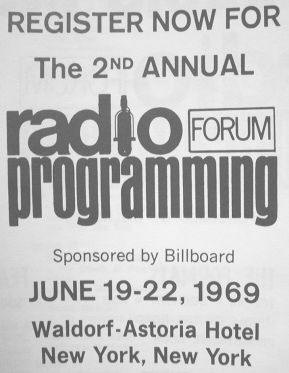
One of the things I remember was that I was invited to be part of a session at the Billboard Radio Programming Forum held at the Waldorf-Astoria Hotel in New York City. It was only the second one held. I met Billboard's Claude Hall there and we became great friends. Later I palled around with him at the Country Music Convention that fall. What a boost to my ego. But you know, it was all because WAKY and the noise we were making in Louisville was being noticed in the Top 40 Radio world. And it was because of the fabulous team we had built that it was a success. Since I wasn't on the air, I never felt that I contributed that much to its greatness. I was just the catalyst. The jocks and their fabulous performances captivated the market. It was a real team effort. I wish all of them could have gone to New York with me that summer and been able to feel for themselves the results of what we had done in the minds of our peers. 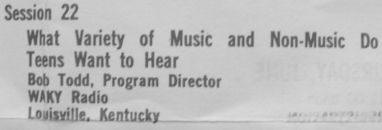
Al Smith left WAKY in the spring of 1970 to work for Ted Turner as his Director of Broadcast Operations to run all of his television and radio stations, one of which -- WTCG Channel 17 in Atlanta -- eventually anchored The Now Explosion. At the same time, Harper and I left WAKY together in March or April of 1970 to join up with Bob Whitney and create The Now Explosion in Atlanta. The Now Explosion was the first Top 40 TV format, the forerunner of MTV. We became the first "telejockeys." You can learn more about that adventure by going to the Now Explosion Website. 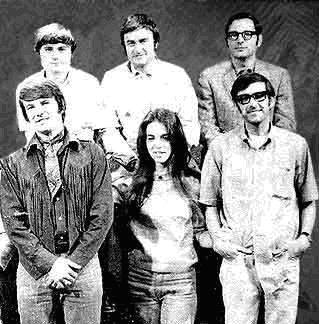
The Now Explosion Crew in In 1970
Top row (l to r) Director Steve Rash, Producer Bob Whitney,
Financial Partner Joseph Field, founder of Entercom.
Bottom row (l to r) Video DJ Bob Todd (Thurgaland),
Dancer/production assistant Maggie Spadafora, and Video DJ Skinny Bobby Harper. 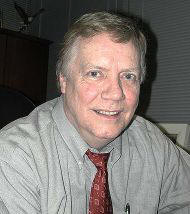
Al Smith Today
In the fall of 1970, after Al Smith joined Ted Turner as his Director of Broadcast Operations, the Now Explosion died because of awkward 2" tape distribution. Al and I became partners in a Chattanooga radio station. We worked together in New Orleans and later in California in the 80s. Al just retired from operating an entire town's radio stations for Infinity CBS in Fresno, California after a career that spanned nearly 50 years in radio. Al remains a lifelong friend as does Gary Burbank. I play golf with Gary often here in Florida and see him regularly.
|
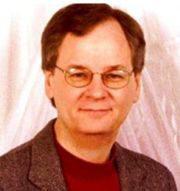
| Mike Summers Today | |
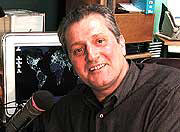 | |
Len King Today |
Len King -- the current voice of CNN promos and Larry King's announcer -- worked at WAKY as a newsman in the early 70s. He later worked with Al Smith and me in New Orleans in the mid 70s. Len also remains a great friend -- as does former WAKY newsman (1969-1971) Mike Summers. Len and Mike later made a name for themselves starting Ted Turner's CNN Radio. Mike even came to Florida for a year to help me in my business here. We're all still in contact with one another and have remained so all these years. As I said, it was indeed a team. As for Bob Watson and the WAKY News Department, I let news alone. Bob Watson was doing such a great job that he didn't need my meddling. Mike and Len and Bob need to tell that part of the story.
The Big 79 in 1969 holds unforgettable memories not only for me, but for all of Louisville. WAKY in 1969 was radio at its best; the way radio used to be -- the way it should be: competitive, fun, alive, exciting, emotional and challenging...a life-changing experience. The Big 79 was one of the great Top 40 Radio stations of all time. But of course, I'm prejudiced.
So that's my side of the story about WAcKY. As Program Director and creator of "WAKY The Big 79" -- at least as ONE of the torch bearers for that one short year -- it means a lot to me. And it does to you, too, or you wouldn't have read this far. But at most it'd just be slightly interesting to those radio people who weren't around in those golden days of Top 40 yesteryear. There aren't many around today who were there and we're becoming fewer every year.
Among the many things that Bob Harper taught me over the years I knew him was that lifelong friends are irreplaceable. It is up to us who are still alive who remember those exciting days of yesteryear to document our stories before it's too late; and to not forget those who came before us and made us who we are today. So much thanks goes to John Quincy for caring enough to develop this site. Hopefully this Internet tribute and others like it for other great Top 40 Radio stations will serve as a springboard for even more recollections and reconnections. I hope so. I hope this all leads to a reunion of some kind for those of us who remember Top 40 Radio in its glory years. I feel so grateful to have known my Big 79 WAKY compatriots.
I know I've rambled. But reading this back I think what this points out is at least some of us old-timers are still around, and our stories are similar in all of the great radio market of America -- and many of the not-so-greats, too. The medium markets and small markets also have their stories to tell. Many of the Classic Top 40 jocks are gone or lost to the ether and seemingly un-findable. But maybe -- just maybe -- thanks to the Internet --maybe not? If you're one of us, what can you add to the story of Top 40 Radio? 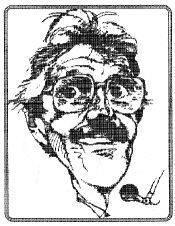
Bob Harper 1939-2003
An Addendum As for our beloved radio, it is not the same today. I say this with sadness in my heart. One company owning all or most of the radio stations in any given market with no real meaningful local involvement -- or certainly limited local concern -- signals the ruination of what once was a great medium with a message. It is what it was no more. I guess I sound like a lot of old guys lamenting "the way it was," but it seems to me that deregulation and syndication has had a negative impact on local radio. There is little or no local excitement, no real competition -- and the worst part of it is -- there is no farm team. Nobody is learning from those that came before them how to be on the air. There are no more mentors like Bob Harper and Bill Bailey coming along. The real legendary talents are mostly gone -- or leaving us quickly.
The big names and local celebrities, if you will, in "those days" (the 50s and 60s) were the DJs -- the Top 40 jocks. In many ways, we were bigger than the recording artists. Music acts came and went. The top jocks made the music -- and the hits. They were always there for the listeners. And there was always another record vying to be #1. As it turns out, the musical artists through replay as oldies have ultimately lasted longer than the jocks, so the artists have become the stars of today. We were just Picassos painting billboards. But what billboards they were. Today there are no longer any real magical local radio personalities; or very few anyway. Yup. The jocks were tops in those days. Today's radio people have no idea what it was like to ride the airwaves with such excitement. It was magic. It was a heady experience.
Almost Wacky. Bob Todd
Ocala, Florida
February 5, 2005 (36 years after 1969) |